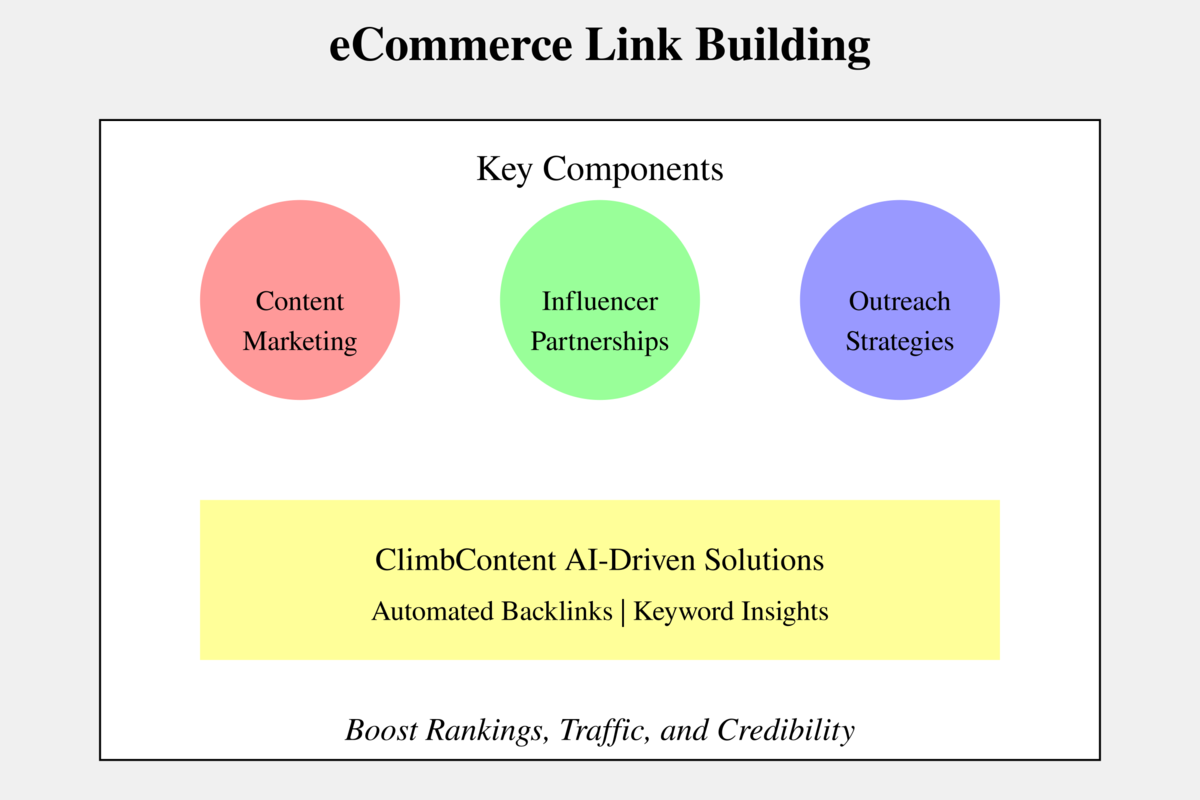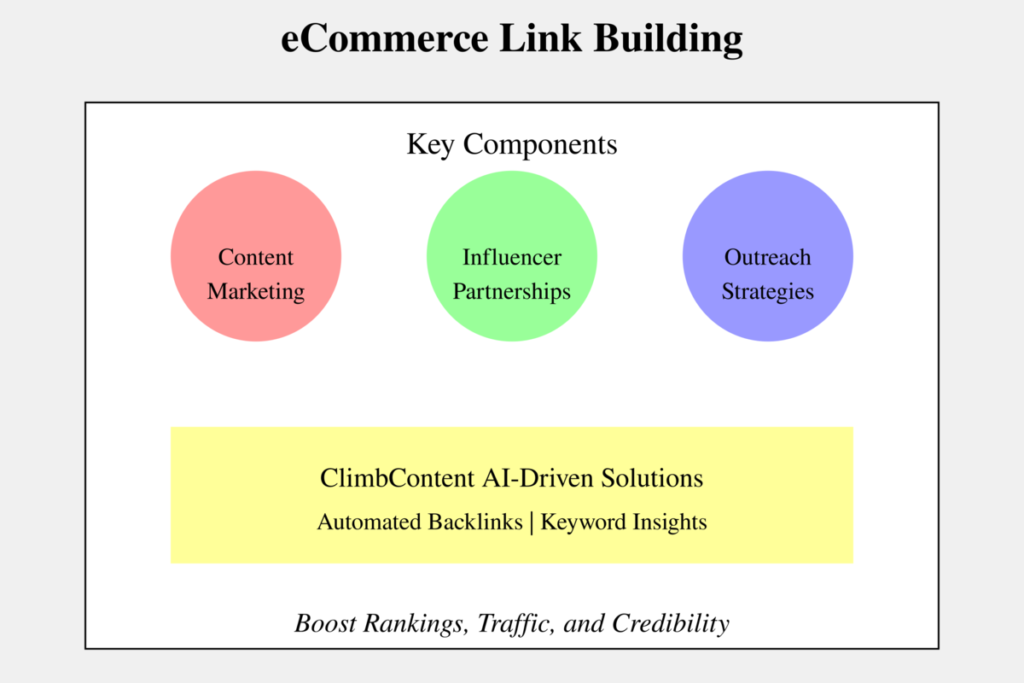Table of Contents
- Introduction
- What is eCommerce link building?
- What are the different types of links valuable for eCommerce websites?
- What role do content marketing strategies play in eCommerce link building?
- How does link building impact eCommerce site traffic and sales?
- What are the common challenges of eCommerce link building?
- How can influencers contribute to eCommerce link building efforts?
- How can partnerships and collaborations enhance eCommerce link building?
- What are the best practices for outreach in eCommerce link building?
- How can Climbcontent help in ecommerce link building?
- Summary
Introduction
In today’s competitive eCommerce landscape, effective ecommerce link building is essential for online success. By creating valuable hyperlinks from trusted sources, eCommerce businesses can boost their search engine rankings, attract more traffic, and build credibility. Understanding the different types of links, employing content marketing strategies, and leveraging influencer partnerships can significantly enhance your link-building efforts. Discover how ClimbContent can revolutionize your eCommerce link-building tactics through AI-driven backlink generation and insightful keyword performance analytics. Get ready to elevate your online store to new heights with a robust and strategic link-building approach!
What is eCommerce link building?
eCommerce link building involves creating hyperlinks from other websites to an online store. This practice aims to boost the store’s search engine rankings and attract more traffic. It helps in gaining credibility and authority in a specific niche. High-quality backlinks from reputable websites are particularly valuable. These links can be earned through various methods like guest blogging, partnerships, and influencer collaborations. Regularly monitoring and maintaining these links is crucial. An effective link-building strategy can significantly improve a store’s visibility and sales. The primary focus is on acquiring links that are relevant and beneficial to the eCommerce site.
What are the different types of links valuable for eCommerce websites?
In the realm of eCommerce, various types of links play crucial roles in enhancing website functionality and SEO. Internal links guide users through the site, improving navigation and dwell time. External links, especially from reputable sites, boost credibility and organic search rankings. Backlinks, or inbound links, are particularly valuable as they signify trust and authority. Affiliate links generate additional revenue streams. Social media links drive traffic and engage customers on multiple platforms. Lastly, product links directly lead customers to purchase pages, increasing conversion rates. Combining these links strategically can significantly impact an eCommerce website’s success.
What role do content marketing strategies play in eCommerce link building?
Content marketing strategies play a pivotal role in eCommerce link building by creating valuable and engaging content that attracts high-quality backlinks. Through informative blog posts, infographics, and videos, businesses can provide useful information that appeals to their target audience. These pieces of content are frequently shared and cited, increasing the website’s visibility and domain authority. Additionally, content marketing helps build relationships with influencers and industry leaders who can also link back to the site. By consistently producing high-quality content, eCommerce sites can naturally earn the trust and attention of both customers and search engines, leading to improved search rankings and more organic traffic. This organic growth is essential for long-term success.
How does link building impact eCommerce site traffic and sales?
Link building significantly impacts eCommerce site traffic and sales by improving search engine rankings. When reputable sites link to your eCommerce store, search engines view it as a sign of credibility. This boosts your site’s visibility in search results. Higher rankings typically lead to more organic traffic, which means more potential customers visiting your site. Additionally, quality backlinks can drive direct referral traffic from the sites linking to you. This targeted traffic is more likely to convert into sales. Links from authoritative sources also build trust with customers, making them more willing to purchase. Overall, robust link-building strategies can result in increased visibility, traffic, and ultimately, higher sales for eCommerce sites.
What are the common challenges of eCommerce link building?
eCommerce link building presents several challenges. High competition makes it hard to stand out and gain quality backlinks. Finding relevant sites willing to link back is also tough. Many website owners demand high fees for backlinks, which strains budgets. Creating unique, compelling content that attracts organic links requires considerable effort. Additionally, search engines constantly update their algorithms, affecting link-building strategies. There’s also the risk of penalization if using black-hat techniques. Lastly, tracking the effectiveness of link-building initiatives can be difficult, making it hard to measure ROI and make necessary adjustments.
How can influencers contribute to eCommerce link building efforts?
Influencers can significantly boost eCommerce link building efforts by leveraging their wide reach and trusted authority. When influencers share content or reviews, they naturally create high-quality backlinks to the eCommerce website. These backlinks not only drive traffic but also improve the site’s search engine rankings. Influencers can collaborate on guest blogs, social media posts, and product reviews. Their honest opinions resonate well with their audience, fostering trust and credibility. Additionally, influencers often engage with their followers through comments and shares, further amplifying the visibility of the eCommerce brand. By involving influencers in link building strategies, businesses can effectively enhance their online presence.
How can partnerships and collaborations enhance eCommerce link building?
Partnerships and collaborations can significantly enhance eCommerce link building. By teaming up with relevant businesses or influencers, companies can gain access to new audiences. This exposure helps in acquiring high-quality backlinks, which improve search engine rankings. Moreover, collaborative content can be shared across different platforms, extending its reach. Joint ventures also foster trust and credibility, making online shoppers more likely to engage. The shared resources and knowledge from these alliances lead to creative link-building strategies. Ultimately, these partnerships create a mutually beneficial environment, driving growth and success in eCommerce
What are the best practices for outreach in eCommerce link building?
Effective outreach in eCommerce link building requires clear strategies and genuine engagement. Start by identifying relevant and authoritative websites within your niche. Personalize your outreach emails to establish a connection and show you’ve done your research. Offer value, such as unique content or mutual promotion, to incentivize collaboration. Follow up politely if there’s no response. Use tools to track your outreach efforts and measure success rates. Additionally, diversify your outreach methods by leveraging social media and industry forums. Maintaining professionalism and transparency in all communications is crucial for building lasting relationships. Always focus on quality over quantity to ensure sustainable growth.
How can Climbcontent help in ecommerce link building?
ClimbContent can significantly enhance your eCommerce link-building strategies through several advanced and automated features:
1. Automatic and Relevant Backlink Suggestions: ClimbContent uses AI to suggest contextually relevant backlinks from your existing content. This helps in shaping a solid internal linking strategy that can promote better cohesion and SEO effectiveness across your website’s content.
2. AI-Driven Backlink Generation: The plugin is capable of automatically generating backlinks to the top ten pages on Google. This not only aids in quick content indexing but also leverages high-traffic pages to improve the visibility of your new content.
3. Link Distribution Analytics: ClimbContent’s AI technology identifies the best phrases and sections within your content for linking, optimizing both internal and external SEO links. This ensures that your backlink profile is robust and strategically distributed, increasing the effectiveness of your efforts.
4. Time-Efficiency: By automating the tedious process of backlinking, ClimbContent enables you to focus more on creating high-quality, value-driven content instead of manually curating backlinks, thus saving time and resources.
5. Keyword Performance Insights: ClimbContent provides trend analysis and metrics for your chosen keywords, which helps tailor your content to meet actual user demands. This relevancy boosts the likelihood of natural backlinks, as engaging content attracts more organic links.
Integrating ClimbContent into your eCommerce site can streamline your SEO practices, making your content more discoverable and linked more naturally both within and outside your site, establishing a strong foundation for sustainable growth and improved search engine rankings.
Summary
Effective link building is crucial for eCommerce success, boosting rankings, traffic, and credibility. Key methods include partnerships, influencer collaborations, and content marketing. ClimbContent enhances eCommerce link building via AI-driven backlink generation and keyword insights.

